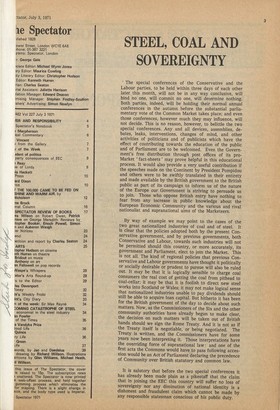STEEL, COAL AND SOVEREIGNTY
The special conferences of the Conservative and the Labour parties, to be held within three days of each other later this month, will not be in any way conclusive, will bind no one, will commit no one, will determine nothing. Both parties, indeed, will be holding their normal annual conferences in the autumn before the substantial parliamentary vote of the Common Market takes place; and even those conferences, however much they may influence, will not decide. This is no reason, however, to belittle the two special conferences. Any and all devices, assemblies, debates, leaks, interventions, changes of mind, and other activities of politicians and of publicists which have the effect of contributing towards the education of the public and of Parliament are to be welcomed. Even the Government's free distribution through post offices of its proMarket ' fact-sheets ' may prove helpful in this educational process. It would also provide a very useful contribution if the speeches made on the Continent by President Pompidou and others were to be swiftly translated in their entirety and made available by the British government to the British public as part of its campaign to inform us of the nature of the Europe our Government is striving to persuade us to join. Those who oppose British entry have nothing to fear from any increase in public knowledge about the European Economic Community and the various and rival nationalist and supranational aims of the Marketeers.
By way of example we may point to the cases of the• two great nationalized industries of coal and of steel. It is clear that the policies adopted both by the present Conservative government, and by previous governments, both Conservative and Labour, towards such industries will not be permitted should this country, or more accurately, its government and Parliament, elect to join the Market. This is not all. The kind of regional policies that previous Conservative and Labour governments have thought it politically or socially desirable or prudent to pursue will also be ruled out. It may be that it is logically sensible to charge coal consumers the real cost of getting the coal from pithead to coal-cellar; it may be that it is foolish to direct new steel works into Scotland or Wales; it may not make logical sense that nationalized industries unable to pay dividends should still be able to acquire loan capital. But hitherto it has been for the British government of the day to decide about such matters. Now, as the Commissioners of the Six and the other community authorities have already begun to make clear, the decision on such matters will be taken out of British hands should we sign the Rome Treaty. And it is not as if the Treaty itself is negotiable, or being negotiated. The Treaty is written, and the Commissioners have for some years now been interpreting it. Those interpretations have the overriding force of supranational law : and one of the first acts the Commons would have to pass following accession would be an Act of Parliament declaring the precedence of Community over British statutory and common law.
It is salutory that before the two special conferences it has already been made plain as a pikestaff that the claim that in joining the EEC this country will suffer no loss of sovereignty nor any diminution of national identity is a dishonest and fraudulent claim which cannot be made by any responsible statesman conscious of his public duty.






















































 Previous page
Previous page